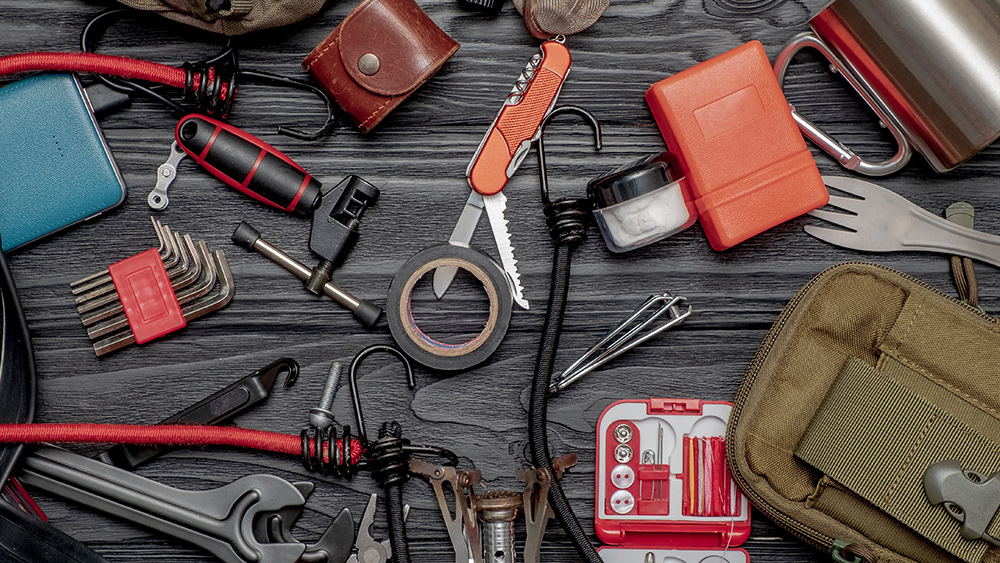Ways to develop mental toughness and a survivor mindset when SHTF
01/27/2023 / By Olivia Cook

Experienced first responders define a survivor mentality as a “frame of mind that promotes self-empowerment.”
Here are some ways to develop the kind of mental toughness you need in a survival scenario. (Related: How to prepare yourself for the collapse of the age of human delusion (and the arrival of human spiritual awakening.)
Accept reality
From a realistic perspective, recognizing what is in your control is key in handling any of life’s situations. According to experienced prepper Bob Rodgers, this acceptance of reality will help you manage your thoughts and regulate your emotions.
Think of survival and behave productively
Rodgers noted that even in the face of problems that you can’t solve, you still must make choices about how to respond. “Whining and moaning (and anything less than good) will keep you in a negative vortex that can rob you completely of your mental strength or quickly lead to demise,” he said.
“Survival is 90 percent psychology,” said Cody Lundin, an internationally recognized professional survival instructor. “When the chips are down, it doesn’t matter how many books on survival you’ve read [because] if you’re a mental and emotional basket case during survival episodes, you’re toast.”
Stay calm and do breathing exercises
Your survival depends on how you prepare yourself mentally and emotionally for survival. Rational thinking can save your neck and keep your cool. Practice how to regulate your breath to control your stress and anxiety.
Learn how to practice quick progressive muscle relaxation exercises to relax your body and center yourself.
“Learning to control anxiety and panic reactions is a skill that can and should be used in everyday life – but finding yourself in a life-threatening situation is not the time to begin practicing those skills,” said combat psychologist Dr. Neal Olshan.
Be a leader and believe in yourself
You need leadership skills because you may find yourself responsible and accountable for people’s lives and safety.
Stay calm, assess the situation and avoid being complacent. This takes discipline to develop, but it could be as simple as being mindful of the state of the environment around you and generating what-if scenarios and making action plans. Having a Plan B or C to your Plan A wouldn’t hurt either.
Be decisive
Weigh the pros and cons to arrive at the best decision possible by evaluating if you will be the only one dealing with the effects of your decision or will other people be affected by it too. The bottom line is you have to stick to your decisions and run with them.
Find hope and a reason to be alive
Another fuel that propels a survivor’s mindset is what would motivate you to stay alive in a life-and-death situation. For Steve Callahan, author of “Adrift: Seventy-six Days Lost at Sea,” it was family. Realize that you can do something and you have something worth fighting for.
Focus on how you can get better rather than focusing on how hard life is.
Control your mind and your thought processes
Ground yourself by becoming aware of your thoughts and learn to sift through them with a little mental exercise to figure out which thoughts are good, bad or neutral. Get rid of the negative ones that usually stop you from thinking clearly.
Breathe if you’re feeling overwhelmed so you can focus and recenter your thoughts. Think of your loved ones – your family and your friends – because you don’t want to see them panicking.
Develop a personal mantra
In the psychology of self-preservation, if you say something repeatedly, the brain will do everything in its power to make the repeated mantra occur. Therefore, repeating phrases like “I am a survivor,” “I can adapt” or “I am resilient” can help you survive tough situations.
Learn the power of focused anger
Anger is wasted emotion, and uncontrolled anger can lead to dire consequences. However, under certain circumstances, controlled anger activates the basic survival instinct that can alert your body’s physiology to be prepared for a challenge and force your brain to focus on a solution that leads to survival.
Develop your physical strength
Once your mind is prepared, you can begin the physical side of things.
Rodgers mentioned the four main attributes of general fitness: strength (your level of ability to produce a great deal of force to overcome a certain amount of resistance), endurance (your ability to continuously exert a certain amount of force for an extended period of time), stamina (a combination of both strength and endurance) and mobility (being able to securely move all of your joints through their full range of motion).

Train, practice… train again, practice again
You need to keep training your mind and practicing if you want to have a survival mindset. Staying sane in a survival situation is a feat in itself. It takes a lot of mental toughness to respond to hostile conditions and make it out in one piece – physically, mentally and emotionally.
“As a prepper, your focus should be keenly aimed at preparing yourself to become strong enough to be useful to those around you in times of a crisis – having your mind together and your body fit and ready,” said Rodgers.
Watch Dr. Pam Popper explain the importance of developing mental toughness below.
This video is from the Wellness Forum Health channel on Brighteon.com.
More related stories:
Mental preparedness: How to think like a survivalist.
Are you THRIVING or SURVIVING? Science reveals your mindset is key.
Survival tips: Dealing with depression after SHTF.
Sources include:
Submit a correction >>
Tagged Under:
determination, emotional health, endurance, mental health, mental strength, mental toughness, Mindset, mobility, preparedness, prepping, Psychology, SHTF, stamina, strength, survival, survivor mindset
This article may contain statements that reflect the opinion of the author
Get independent news alerts on natural cures, food lab tests, cannabis medicine, science, robotics, drones, privacy and more from NewsTarget.com
Get independent news alerts on natural cures, food lab tests, cannabis medicine, science, robotics, drones, privacy and more from NewsTarget.com
RECENT NEWS & ARTICLES
COPYRIGHT © 2017 · SURVIVAL NEWS





















